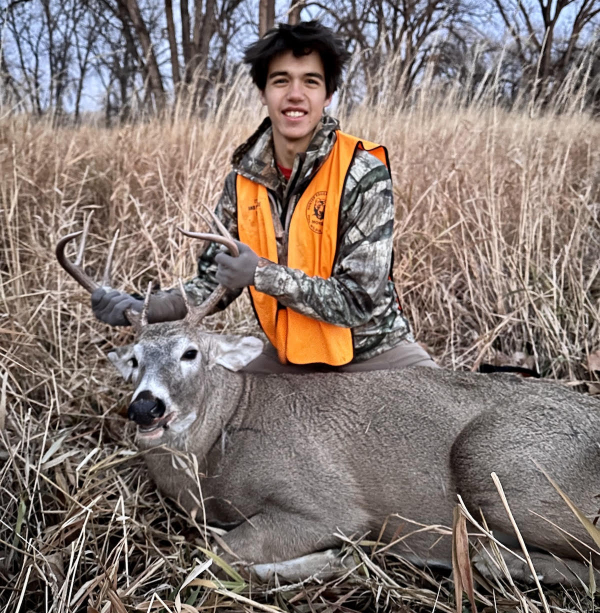Every first hunt is special. The benefits of this one could last a lifetime
Tyler is a cool kid, but he’s not nearly as cool as he thinks he is, or as he wants to be.
The same could be said of any 17-year-old boy, my teenage self included. I recognize more than a shaky self-confidence in Tyler; in him I recognize my own slight frame, my grit and determination as a distance runner, and my occasional obliviousness to social cues.
I’ve known Tyler since I started coaching him as a cross country runner back when he was in middle school. He’s now a high school junior, and I realized mid-way through the season there’s plenty I don’t know about him, including how he manages to get himself through the world. He lives with geriatric grandparents who have passing interest in his academic or athletic accomplishments. He’s hungry all the time, literally. He carefully manages the scant money he earns. And he is responsible for most of his decisions. Those are weighty things for anyone to carry around, let alone a prairie teenager.
But despite his headwinds, Tyler is an accomplished runner and student, already thinking ahead to college and a career, and his magnetism draws people toward him. At cross country practice earlier in the fall, when Tyler asked if he could talk to me following practice, I figured it was for a letter of recommendation for a scholarship or maybe a job reference.
Instead, Tyler shuffled up after practice looking bashful. Then he popped his question: “Would you teach me how to hunt?”
Whoa. Not at all what I expected. But I told him, sure, and we talked about his interest in hunting deer and maybe upland birds. I’ve mentored plenty of apprentices, but generally they’ve been adult-onset hunters who have a grounding in cooking and food, a plan for the meat, plus they generally have disposable time to devote to hunting. Tyler has none of those things. Because we still had a month of cross country season ahead of us, and because I didn’t want to intrude on our coach-athlete relationship, we agreed to hunt together after the XC season ended.
Tyler has never taken Hunter Education, but thanks to Montana’s excellent Apprentice Hunter Program, he was eligible to buy a provisional deer license as long as his mentor — that’s me — accompanied him in the field. After two years of apprenticing, if he wanted to be a lifelong hunter, he’d have to complete Hunter Ed and buy full-priced licenses. The apprentice program is perfect for a kid like Tyler, who doesn’t have any family tradition of hunting and who might not be introduced to it any other way.
We spent our first afternoons together going through the basics of firearms function and gun safety, shooting my deer rifle at the range, scouting my hunting area, and talking about Tyler’s specific preferences: a whitetail deer, a buck, and to process the carcass together so that he’d have meat to feed himself and his family. I outfitted Tyler with his first hunting clothes, a backpack, binocular, and knife.
Then we went hunting, though our sessions were constrained by Tyler’s job — he bags groceries at a local supermarket — and school; he doesn’t get released until about 3 p.m. The first session we were busted by a changing wind, and the second time we got out too late to sneak into place. Finally, it all came together last week and Tyler connected with a handsome whitetail buck.

But it was everything after the deer hit the ground that makes me so hopeful not only for Tyler but for other would-be hunters who summon the courage to ask for help from a mentor. A couple days later, after we got the buck broken down in quarters and Tyler arrived in my kitchen with his knife, we took apart loins and roasts, cut and wrapped stew meat and talked all the while about our respective music preferences and Tyler’s plans for this windfall of prime meat.
I realized as we talked that Tyler has no experience preparing his own food, which got us talking about food insecurity in general but also about his own situation, where he doesn’t always have a hot meal available. I could tell that my high praise of the culinary value of top-round roasts and reverse-seared backstraps was lost on Tyler. We were halfway through processing his buck when I asked the question that defined the rest of our session: “Would you eat more deer meat if it was ground, rather than whole-muscle cuts?”
“Oh yeah!” agreed Tyler. “I’d eat the hell out of burger.”
That settled it. We packaged the rest of his buck in bags to be thawed and ground when I got my grinder running later in the season.
When I checked in with Tyler earlier this week he was cooking venison for his grandparents, a simple meal of pan-fried deer steaks. But in this Thanksgiving week, it might be the most substantial and meaningful meal I can imagine, and one that will hopefully establish traditions in Tyler’s family well into the next generation.
Our community of hunters is built on this give and take. If you are interested in hunting but don’t have the knowledge, gear, or access, seek out a hunter who can help provide them. If you’re a hunter with all those things, find ways to share them. And if you’re a hunter who is fortunate enough to have filled your freezer with game meat, or you have an extra tag, consider donating your extra harvest to someone in your own community.
— Andrew McKean, Outdoor Industry Communication Council (OICC)
